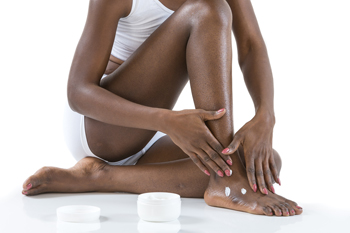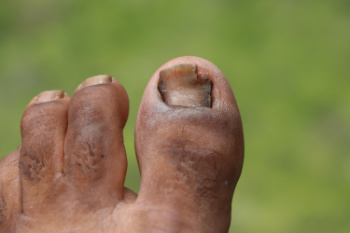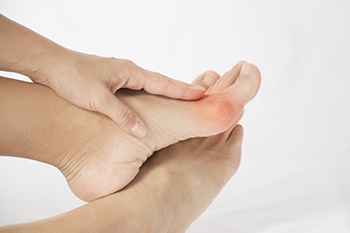Items filtered by date: February 2024
Causes of Night Foot Pain

Every day, foot pain affects millions of people worldwide, ranging from dull aches to sharp stings. Some experience foot pain solely at night, disrupting their sleep quality. One common cause is plantar fasciitis, where the tissue running from the foot's front through the arch to the heel becomes inflamed, often worsened by factors like flat feet or tight calf muscles. Another foot pain culprit is Morton’s neuroma, which is characterized by pinching or inflammation around the nerves in your toes and can lead to burning or shooting pains. Pregnancy-related changes in calcium levels may cause leg and foot cramps. Diabetes can damage foot nerves due to high blood sugar levels. Fibromyalgia sufferers often experience widespread pain, including in the feet, exacerbated at night by low cortisol levels. Lifestyle factors and foot anatomy also contribute to nighttime foot pain. If you are experiencing persistent nighttime foot pain, it is suggested that you make an appointment with a podiatrist for a proper diagnosis and appropriate treatment.
Foot Pain
Foot pain can be extremely painful and debilitating. If you have a foot pain, consult with one of our podiatrists from Ankle & Foot Care Center. Our doctors will assess your condition and provide you with quality foot and ankle treatment.
Causes
Foot pain is a very broad condition that could be caused by one or more ailments. The most common include:
- Bunions
- Hammertoes
- Plantar Fasciitis
- Bone Spurs
- Corns
- Tarsal Tunnel Syndrome
- Ingrown Toenails
- Arthritis (such as Gout, Rheumatoid, and Osteoarthritis)
- Flat Feet
- Injury (from stress fractures, broken toe, foot, ankle, Achilles tendon ruptures, and sprains)
- And more
Diagnosis
To figure out the cause of foot pain, podiatrists utilize several different methods. This can range from simple visual inspections and sensation tests to X-rays and MRI scans. Prior medical history, family medical history, and any recent physical traumatic events will all be taken into consideration for a proper diagnosis.
Treatment
Treatment depends upon the cause of the foot pain. Whether it is resting, staying off the foot, or having surgery; podiatrists have a number of treatment options available for foot pain.
If you have any questions, please feel free to contact our office located in Jupiter, FL . We offer the newest diagnostic and treatment technologies for all your foot care needs.
The Significance of Practicing Everyday Foot Care

Practicing everyday foot care is an essential yet often overlooked aspect of overall well-being. The feet, our foundation for mobility, endure daily stresses and strains, making regular foot care a vital practice. By incorporating simple routines into our daily lives, such as washing our feet, moisturizing, and inspecting them for any signs of discomfort or abnormalities, we can prevent common issues like dry skin, fungal infections, and calluses. Wearing proper footwear that provides support and comfort is equally vital, as ill-fitting shoes can lead to a range of problems, from blisters to chronic conditions such as bunions. Regular toenail maintenance helps prevent ingrown toenails and other nail-related complications. Additionally, incorporating gentle stretching exercises and elevating the feet after prolonged periods of standing or sitting promotes circulation and reduces swelling. Prioritizing everyday foot care not only maintains the health and appearance of our feet but contributes to overall physical well-being. If you are seeking additional tips on effective daily foot care, it is suggested that you consult a podiatrist.
Everyday foot care is very important to prevent infection and other foot ailments. If you need your feet checked, contact one of our podiatrists from Ankle & Foot Care Center. Our doctors can provide the care you need to keep you pain-free and on your feet.
Everyday Foot Care
Often, people take care of their bodies, face and hair more so than they do for their feet. But the feet are a very important aspect of our bodies, and one that we should pay more attention to. Without our feet, we would not be able to perform most daily tasks.
It is best to check your feet regularly to make sure there are no new bruises or cuts that you may not have noticed before. For dry feet, moisturizer can easily be a remedy and can be applied as often as necessary to the affected areas. Wearing shoes that fit well can also help you maintain good foot health, as well as making it easier to walk and do daily activities without the stress or pain of ill-fitting shoes, high heels, or even flip flops. Wearing clean socks with closed shoes is important to ensure that sweat and bacteria do not accumulate within the shoe. Clean socks help to prevent Athlete’s foot, fungi problems, bad odors, and can absorb sweat.
If you have any questions please feel free to contact our office located in Jupiter, FL . We offer the newest diagnostic and treatment technologies for all your foot and ankle needs.
How the Right Shoes Help Prevent Toenail Fungus
 Toenail fungus, a common and contagious nail infection, can be impacted by footwear. Understanding how shoes can contribute to toenail fungus is the first step toward the prevention and recurrence of fungal infections. Tight, ill-fitting shoes create the right environment for fungus to grow, because these shoes trap sweat and moisture and provide a warm, dark space. Airflow helps keep feet dry, but tighter shoes often don’t have good ventilation. On the other hand, breathable, moisture-wicking footwear can reduce the risk of toenail fungus. Fungal infections are contagious, so it’s best to avoid sharing shoes. Regularly disinfecting shoes can also help prevent the spread of fungal infections. Not only are your feet happier overall when you prioritize comfort, proper fit, and breathability in your shoes, but you also minimize the likelihood of toenail fungus taking hold and persisting. If you suspect toenail fungus, it is suggested you consult with a podiatrist who can provide a treatment plan and personalized recommendations for footwear.
Toenail fungus, a common and contagious nail infection, can be impacted by footwear. Understanding how shoes can contribute to toenail fungus is the first step toward the prevention and recurrence of fungal infections. Tight, ill-fitting shoes create the right environment for fungus to grow, because these shoes trap sweat and moisture and provide a warm, dark space. Airflow helps keep feet dry, but tighter shoes often don’t have good ventilation. On the other hand, breathable, moisture-wicking footwear can reduce the risk of toenail fungus. Fungal infections are contagious, so it’s best to avoid sharing shoes. Regularly disinfecting shoes can also help prevent the spread of fungal infections. Not only are your feet happier overall when you prioritize comfort, proper fit, and breathability in your shoes, but you also minimize the likelihood of toenail fungus taking hold and persisting. If you suspect toenail fungus, it is suggested you consult with a podiatrist who can provide a treatment plan and personalized recommendations for footwear.
If left untreated, toenail fungus may spread to other toenails, skin, or even fingernails. If you suspect you have toenail fungus it is important to seek treatment right away. For more information about treatment, contact one of our podiatrists of Ankle & Foot Care Center. Our doctors can provide the care you need to keep you pain-free and on your feet.
Symptoms
- Warped or oddly shaped nails
- Yellowish nails
- Loose/separated nail
- Buildup of bits and pieces of nail fragments under the nail
- Brittle, broken, thickened nail
Treatment
If self-care strategies and over-the-counter medications does not help your fungus, your podiatrist may give you a prescription drug instead. Even if you find relief from your toenail fungus symptoms, you may experience a repeat infection in the future.
Prevention
In order to prevent getting toenail fungus in the future, you should always make sure to wash your feet with soap and water. After washing, it is important to dry your feet thoroughly especially in between the toes. When trimming your toenails, be sure to trim straight across instead of in a rounded shape. It is crucial not to cover up discolored nails with nail polish because that will prevent your nail from being able to “breathe”.
In some cases, surgical procedure may be needed to remove the toenail fungus. Consult with your podiatrist about the best treatment options for your case of toenail fungus.
If you have any questions, please feel free to contact our office located in Jupiter, FL . We offer the newest diagnostic and treatment technologies for all your foot care needs.
Who Is Most at Risk to Develop Bunions
 Bunions, bony protrusions at the big toe joints, can develop due to a variety of factors. While there are lifestyle factors that can contribute, you are more likely to develop bunions if they run in the family, and if you have a certain foot structure. Wearing narrow and ill-fitting shoes increases the chance of bunion formation. Other risk factors for bunions include foot injuries, deformities, activities that place repetitive stress on the feet, or conditions such as arthritis. You can take preventive measures against bunion formation, such as wearing comfortable shoes with adequate toe space and low heels. However, if you already have bunions, they cannot be reversed except through surgery. If you are experiencing pain from bunions, or if you want to address potential risks, it is suggested you consult with a podiatrist who can guide you toward an appropriate treatment plan.
Bunions, bony protrusions at the big toe joints, can develop due to a variety of factors. While there are lifestyle factors that can contribute, you are more likely to develop bunions if they run in the family, and if you have a certain foot structure. Wearing narrow and ill-fitting shoes increases the chance of bunion formation. Other risk factors for bunions include foot injuries, deformities, activities that place repetitive stress on the feet, or conditions such as arthritis. You can take preventive measures against bunion formation, such as wearing comfortable shoes with adequate toe space and low heels. However, if you already have bunions, they cannot be reversed except through surgery. If you are experiencing pain from bunions, or if you want to address potential risks, it is suggested you consult with a podiatrist who can guide you toward an appropriate treatment plan.
If you are suffering from bunion pain, contact one of our podiatrists of Ankle & Foot Care Center. Our doctors can provide the care you need to keep you pain-free and on your feet.
What Is a Bunion?
Bunions are painful bony bumps that usually develop on the inside of the foot at the joint of the big toe. As the deformity increases over time, it may become painful to walk and wear shoes. Women are more likely to exacerbate existing bunions since they often wear tight, narrow shoes that shift their toes together. Bunion pain can be relieved by wearing wider shoes with enough room for the toes.
Causes
- Genetics – some people inherit feet that are more prone to bunion development
- Inflammatory Conditions - rheumatoid arthritis and polio may cause bunion development
Symptoms
- Redness and inflammation
- Pain and tenderness
- Callus or corns on the bump
- Restricted motion in the big toe
In order to diagnose your bunion, your podiatrist may ask about your medical history, symptoms, and general health. Your doctor might also order an x-ray to take a closer look at your feet. Nonsurgical treatment options include orthotics, padding, icing, changes in footwear, and medication. If nonsurgical treatments don’t alleviate your bunion pain, surgery may be necessary.
If you have any questions, please feel free to contact our office located in Jupiter, FL . We offer the newest diagnostic and treatment technologies for all your foot care needs.

